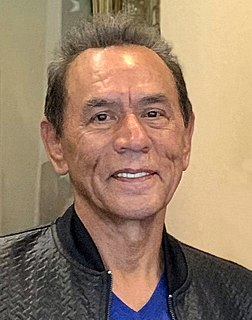A Quote by Wes Studi
At times, I'm thinking negatively, thinking that we don't learn from our mistakes, but then I get more positive-minded. I do believe in the good of humanity.
Related Quotes
Positive thinking is just one small part of positive psychology. Plus, as an approach to well-being, positive thinking only helps you to the extent that it yields one or more positive emotions. The problem with positive thinking is that it sometimes just stays up "in the head" and fails to drip down to become a fully embodied experience.
Learn to manage your mind. Do not let a situation lure you into thinking negatively. Sometimes you will fail but you'll learn for the next time. Every time a negative thought comes at you ZAP IT! Replace it with positive thoughts. That takes energy but the result will be stamina, positive stamina, the necessary ingredient for success.
Somewhere along the line, positive thinking seems to have been confused with magical thinking. There's a notion that if you think positively enough, you can make anything happen by using the power of your mind. All the positive thinking in the world won't deliver good fortune or prevent tragedy from striking.
So what is the difference between "power thinking" and "positive" thinking? The distinction is slight but profound. To me, people use positive thinking to pretend that everything is rosy, when they really believe that it's not. With power thinking, we understand that everything is neutral, that nothing has meaning except for the meaning we give it, and that we are going to make up a story and give something it's meaning.
Believing isn't thinking, but we've been programmed to believe that believing is thinking. To use our intelligence to think means we're keeping the energy active, we're thinking, we're really using the power of our intelligence in a thinking way. But when we've been programmed to believe, we're no longer thinking, because energy flows.
Quotes are like prompts. A way of searching, connecting the dots. Other people's thinking has always - both positively and negatively - jumpstarted my thinking. Quotes are also a way of acting out not just a text, and not just thinking, but the making of a text. The construction of thinking. The quotes are part of those constructions and reflections. Thinking through quotes, which to say scouring a range of texts for insight, is one way to outline the process of thinking/feeling through a subject.
The mainstream perception that conservatives are close-minded and dogmatic while liberals are open-minded and free-thinking has it almost exactly backward. Liberal dogma is settled: The government should do good, where it can, whenever it can. That is President Obama's idea of pragmatism and bipartisanship: He's open to all ideas, from either side of the aisle, about how best to expand government and get the state more involved in our lives.
There's two kinds of thinking. There is conjunctive thinking and there's disjunctive thinking. Disjunctive thinking says it has to be either/or. Now clearly, there are some either/or's - I either trust Christ or I don't. I'm either pregnant or I'm not. But a lot of thinking in Scripture, when it comes to theology is, in my opinion, conjunctive thinking. It's both/and. I believe that and I believe that.
My thought process when I'm on the court is always thinking about getting better, and thinking about how I'm playing. Thinking about it as a process, as the big picture and what I need to work on, instead of being close-minded and thinking, 'I'm so nervous and have to win this match, if I don't, it'll be the worst.'
When we're believing, we're not really thinking, because the belief has walls: "This is what I believe." So what I believe is like a box, and we're taking the energy of our thinking and putting into a box of beliefs, pretending that we're thinking. But we're really stifling our own energy. We create these mental stresses and frustrations, because we're blocking our spirit, so to speak.



































